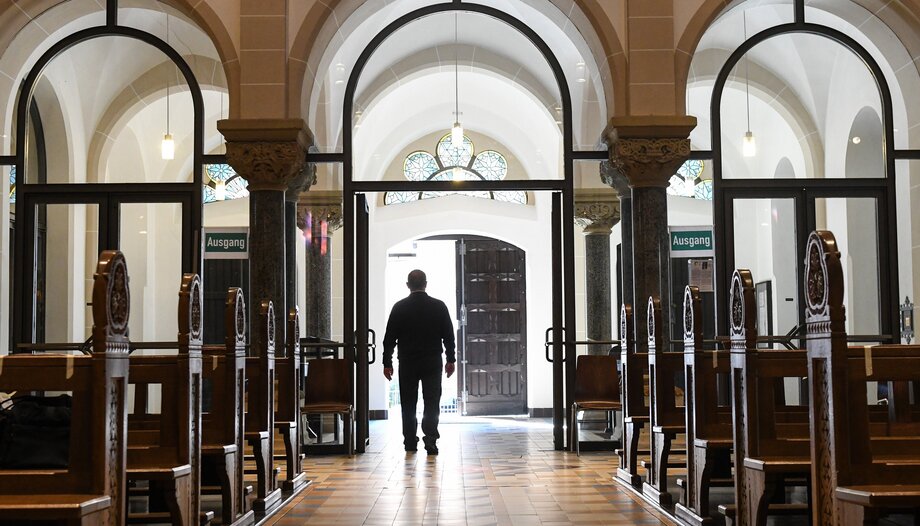Recently published statistics on membership in the Catholic Church in Germany and the "Evangelical Church in Germany" (EKD) reveal a worrying trend. Although the rate of dropout has slowed slightly since its peak in 2022, the figures remain alarming for both institutions.
According to the joint report of the German Bishops' Conference (DBK) and the EKD Council, the number of adherents in the Catholic Church has fallen to approximately 19.8 million, representing 23.7 % of the total population. For its part, the EKD has 17.98 million members, constituting 21.6% of Germany's 83.6 million inhabitants. The other religious groups, including the Orthodox, Evangelicals independent of the EKD, and the EKD, have a membership of 17.98 million, constituting 21.6% of Germany's 83.6 million inhabitants. IslamThe total number of religious denominations in Germany is 10.9 %. This distribution implies that 43.8 % of the German population does not officially profess any religion, evidencing the inexorable advance of secularization and the decline of institutional religiosity.
Participation in the sacraments
The crisis is not only reflected in membership figures, but also in sacramental participation. During 2024, the Catholic Church recorded approximately 116,000 baptisms, down significantly from 131,000 the previous year. Regional Protestant churches reported about 110,000 baptisms. The contrast is even more dramatic when compared to figures from two decades ago: in 2003, the Catholic Church celebrated 206,000 baptisms and Protestant churches 227,500. Regular Mass attendance has also experienced a steep decline, from 15.2 % of Catholics in 2003 to 6.6 % in 2024.
A particularly worrying indicator is the drastic decline in priestly vocations. In 2024, only 29 men were ordained as Catholic priests in the whole of Germany, which is evidence of a severe crisis in the generational replacement of the clergy.
Ecclesiastical crisis in Germany
Several theologians and religious leaders have deeply analyzed this ecclesiastical crisis in Germany. Georg Bätzing, bishop of Limburg and president of the German Bishops' Conference, has characterized the situation as "alarming" and called for reforms to restore social trust. Bätzing argues that while reforms alone will not solve the crisis, their absence will only aggravate the situation. He emphasizes the importance of strengthening the church's presence in social and educational spheres to maintain its relevance.
Kirsten Fehrs, president of the EKD Council, recognizes that although church membership is no longer a social constant, it retains its vital importance as a source of spiritual support and assistance during critical periods. She stresses the need for the Church to be a meeting place that promotes dialogue and strengthens social cohesion.
For his part, Professor Jan Loffeld, a priest of the Diocese of Münster and professor of Catholic Theology in Tilburg (The Netherlands), believes that the trend towards secularization is irreversible, anticipating that the Church will progressively become a smaller minority. In his analysis, Loffeld points out that the Second Vatican Council promoted the idea of a Church "in the world" and not "against the world", but in a social context substantially different from the present one. He considers that, today, evangelization and structural reforms do not seem to be enough to reverse the crisis.
Lack of interest in religious matters
Gregor Maria Hoff, Professor of Fundamental Theology and Ecumenical Theology in Salzburg, agrees that contemporary society has lost interest in traditional religious questions. He proposes that the Church should identify "new contact zones" in areas where it can maintain its relevance, such as educational institutions and social spheres, instead of isolating itself in dogmatic positions that do not generate interest among the population.
Thorsten Latzel, president of the Evangelical Church in the Rhineland, contextualizes religious decline within a broader process of deinstitutionalization that also affects political and trade union organizations. This perspective suggests that the loss of ecclesiastical influence reflects a deeper cultural transformation in the relationship between individuals and traditional institutions.
Sociologist Detlef Pollack has identified an increase in anti-religious attitudes in German society over the last five years. He notes a decline in the valuing of religious holidays, although he points out that active practitioners continue to appreciate the Church as a space of community and respect. However, the disconnection of the majority with church life reinforces prejudices and complicates outreach efforts.
Secularization in Germany
The decline in both Catholic and Protestant membership in Germany is evidence of a process of secularization that has been going on for decades. High numbers of dropouts and a shortage of priestly vocations reveal a structural crisis that is difficult to solve. While some church leaders propose reforms and evangelistic renewal, experts suggest that these measures may prove insufficient to counteract the downward trend.
A survey conducted by the "Aachener Zeitung" newspaper among its readers in the traditionally Catholic region of Aachen illustrates the loss of ecclesiastical influence. To the statement "It is sad to see more and more people leaving the Church", only 25 % agreed, while 69 % disagreed (6 % ns/nc). Although not statistically representative, the survey reflects the current social climate.
Faced with this reality, the Church will have to redefine its role in German society. More than half a century ago, the then Professor Joseph Ratzinger warned in "Introduction to Christianity" (1968) that the Church would become a minority and lose many of its privileges. Already as Pope Benedict XVI, he reiterated on numerous occasions the need for believers to conceive of themselves as a "creative minority" capable of preserving the spiritual foundations of Europe. The key question is how this "creative minority" can remain a leaven in a world that increasingly seems to dispense with religion.







